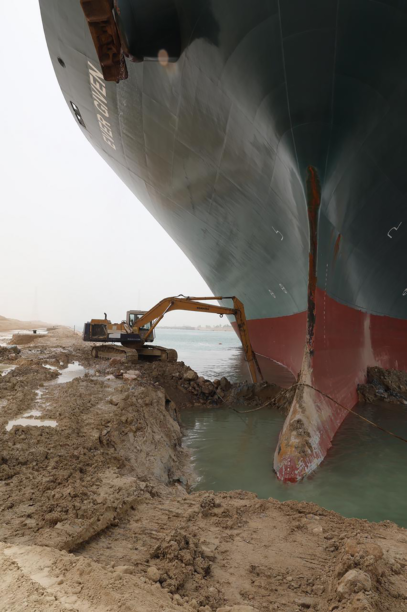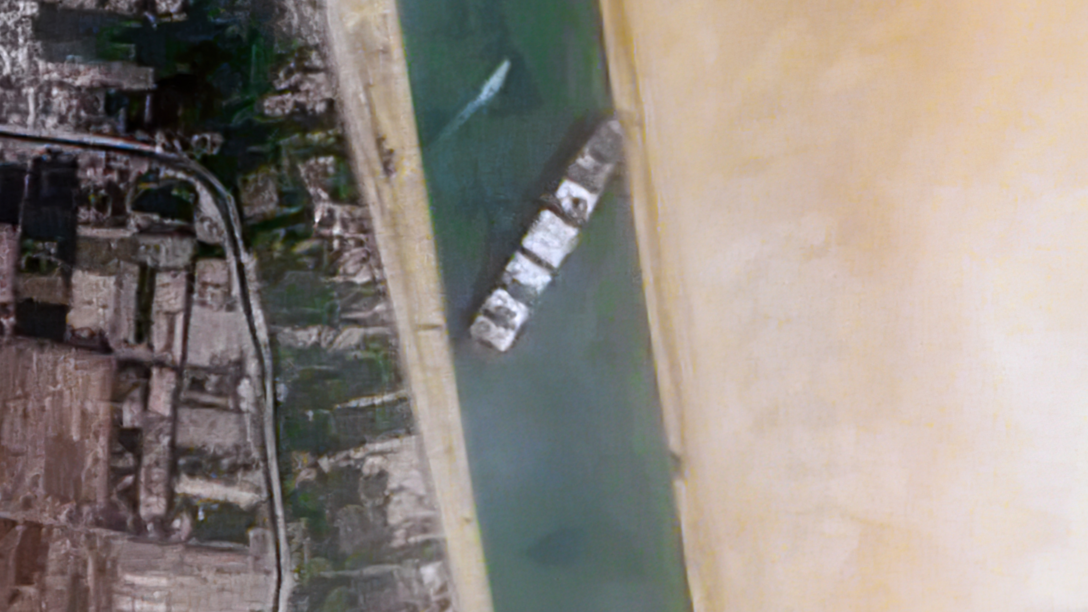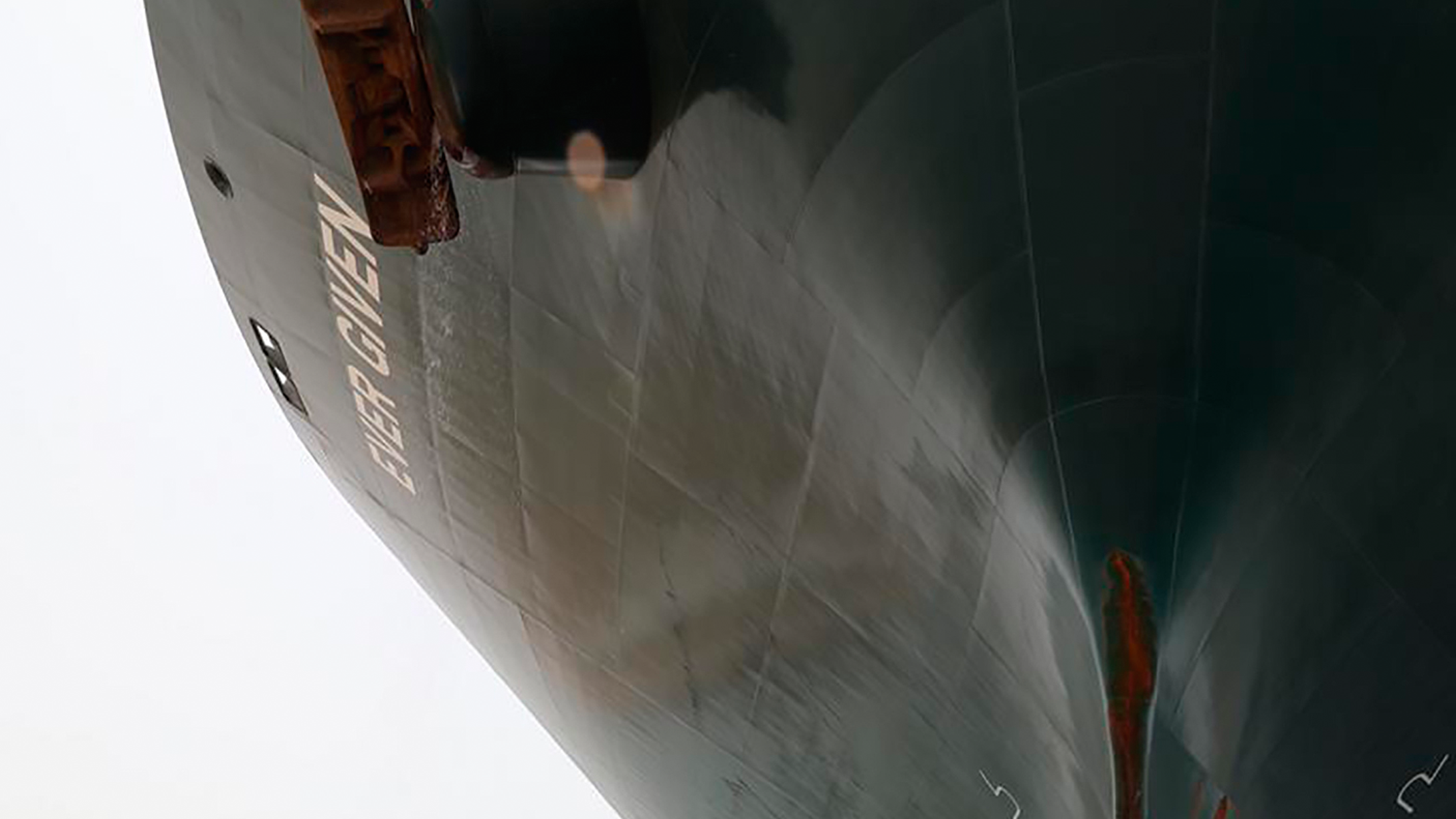The saga of the Ever Given, the container ship trapped for a week in the Suez Canal beginning on March 23, 2021, has been the object of endless Internet memes and jokes over the last few days. The ship reportedly blocked 9.6 billion dollars of traffic in goods each day, as 300 vessels got stuck in traffic behind the jammed behemoth—close to five hundred million dollars in losses per hour.
The Ever Given’s operators claimed that their vessel had become stuck because of wind—a plausible or implausible explanation, depending on whom you ask.
The incident touched a shared nerve all over the world because it revealed something of the hilarious (and terrible) absurdity of global capitalism. Goods are incessantly transferred from place to place now that capitalism operates on a planet-wide scale. Around 12% of world trade passes through the Suez Canal. It was funny to see these vast, unknowable processes go haywire due to something as simple as a boat jammed in a canal.
And, sure, while the Ever Given getting stuck may have resulted in billions of dollars of losses, the disaster felt victimless, distant and abstract, as if it didn’t, or couldn’t, affect us at all. (Though the blockage of the Suez Canal for even a few days did, in fact, have grave effects—forcing Syria to ration oil, for example.)
 Suez Canal Authority via AP
Suez Canal Authority via APThe Ever Given is a truly massive vessel, longer than the height of the Eiffel Tower. The cartoonish dilemma prompted cartoonish solutions, everything from explosives to a petition calling for the Ever Given to remain jammed in the Suez Canal. Memes were, quite literally, all over the map. There was a site dedicated to tracking whether the ship was still stuck, and a map site encouraging users to “get the Ever Given stuck wherever you want it.” Photos of the single crane used to try and dig the gigantic ship out were widely circulated.
Heck. This isn’t even the first time the Ever Given has run into trouble. In 2019, the 1300-foot ship collided with the 75-foot Finkenwerder, a pleasure ferry, on the Elbe river in Germany. Nor is this the first time ships have gotten stuck in the Suez Canal. Between 1967 to 1975, fifteen ships were stranded as a result of the Six-Day War fought by Israel and Egypt, which left the canal blocked at both ends, jammed with mines and sunken debris. The stranded crew members founded ‘The Great Bitter Lake Association,’ a social and mutual aid group with its own postal system and even its own stamps. The last crew members were sent home in 1972.
Owned by a Japanese company, Shoei Kisen Kaisha, but operated by Taiwanese company Evergreen Marine, the Ever Given is registered in Panama. The ship is one of eleven Golden-class container ships built for Evergreen by Japanese shipbuilding company Imabari Shipbuilding. Technical responsibility for the ship falls to German company Bernhard Schulte Shipmanagement. The crew of the ship was entirely Indian, but per standard regulation, two Egyptian maritime pilots boarded before the canal crossing. The ship was finally freed by the crew of the Egyptian tugboat Mashhour.
Though it is not possible to claim that the Ever Given belongs to a specific country, the canal incident played out in a unique way in Taiwan—a de facto state, but one that is not recognized by the majority of the world’s countries. The Evergreen Group that operates the Ever Given is one of Taiwan’s most recognizable companies, not only as a shipping company, but as the operator of EVA Airlines, one of Taiwan’s major air carriers. The ships in the Golden-class container ship series all follow the “EG” naming pattern of the Ever Given, with other ships in the series having such memorable names such as Ever Golden, Ever Gentle, Ever Genius, and odd Taiwanese-English names such as Ever Govern, Ever Greet, and Ever Globe. Other ships operated by the Evergreen Group follow a similar naming pattern of “Ever” followed by some adjective. As a result, there is even a container ship named the Ever Dainty.
Shortly before the Ever Given story made international headlines, Taiwan was in the news owing to a widely reported rash of Taiwanese people changing their name to “Salmon”in order to take advantage of a free promotion at sushi chain Sushiro, which offered free sushi to people whose names contained the characters for “Salmon.” A simple matter, since it costs just 80 NT and takes less than one day to change your name in Taiwan. The Ever Given story and the “Salmon” sushi promotion were the biggest international stories about Taiwan in months. (So much for putting Taiwan on the map for its achievements, such as successfully fending off COVID-19 without ever having to resort to a single lockdown.)
More seriously, though, an understanding of Taiwan’s central importance to global supply chains came about, not for the first time, through breakdowns. Taiwan’s key role in global semiconductor manufacturing, for example, recently emerged due to pandemic-related shortages. Correcting these choke points may be easier said than done (ironically, large container ships like the Ever Given were designed in part to avoid the logistical bottleneck of the Suez Canal.)
Awareness of Taiwan’s precarious role as a dangerous point of overreliance in global supply chains is on the rise. Some have suggested that the Ever Given incident, along with the broader effects of COVID-19, will lead to a rethinking of global supply chains and just in-time delivery, while Russia and other countries are likely to play up their alternative transportation routes to Egypt and the Suez Canal. That’s global capitalism.
 Copernicus Sentinel data 2021 [CC BY 2.0] via Wikimedia Commons
Copernicus Sentinel data 2021 [CC BY 2.0] via Wikimedia CommonsAt the time the Suez Canal was blocked, I saw a few friends in the Taiwanese diaspora posting about how much they identified with the Ever Given, and/or saying that they were culturally proud of the boat. Even non-Taiwanese people posted about identifying with the luckless ship. Basically, maybe that’s humanity in a nutshell. We are all the Ever Given: Stuck in one place, unable to move, and making a mess of things.






